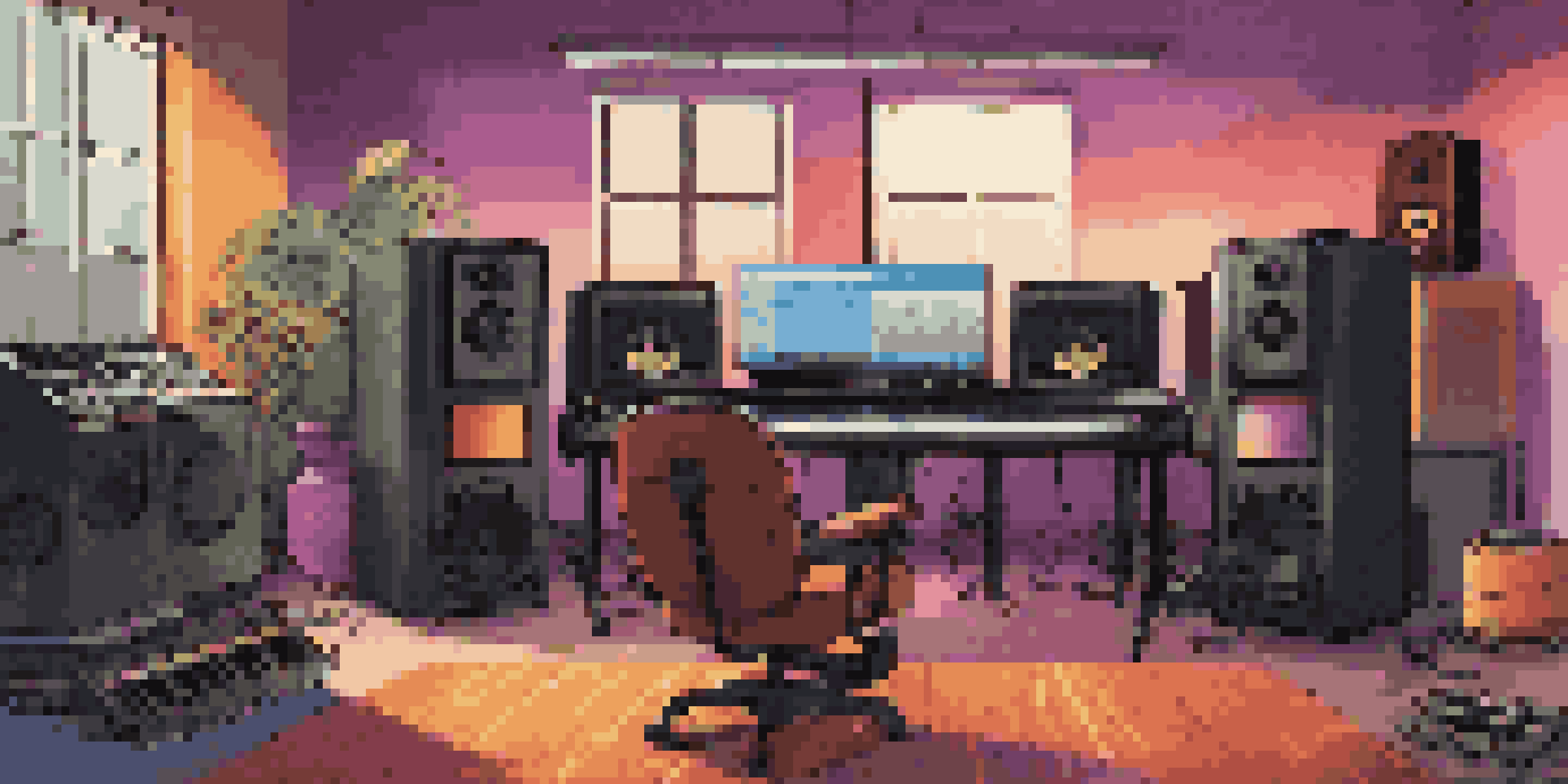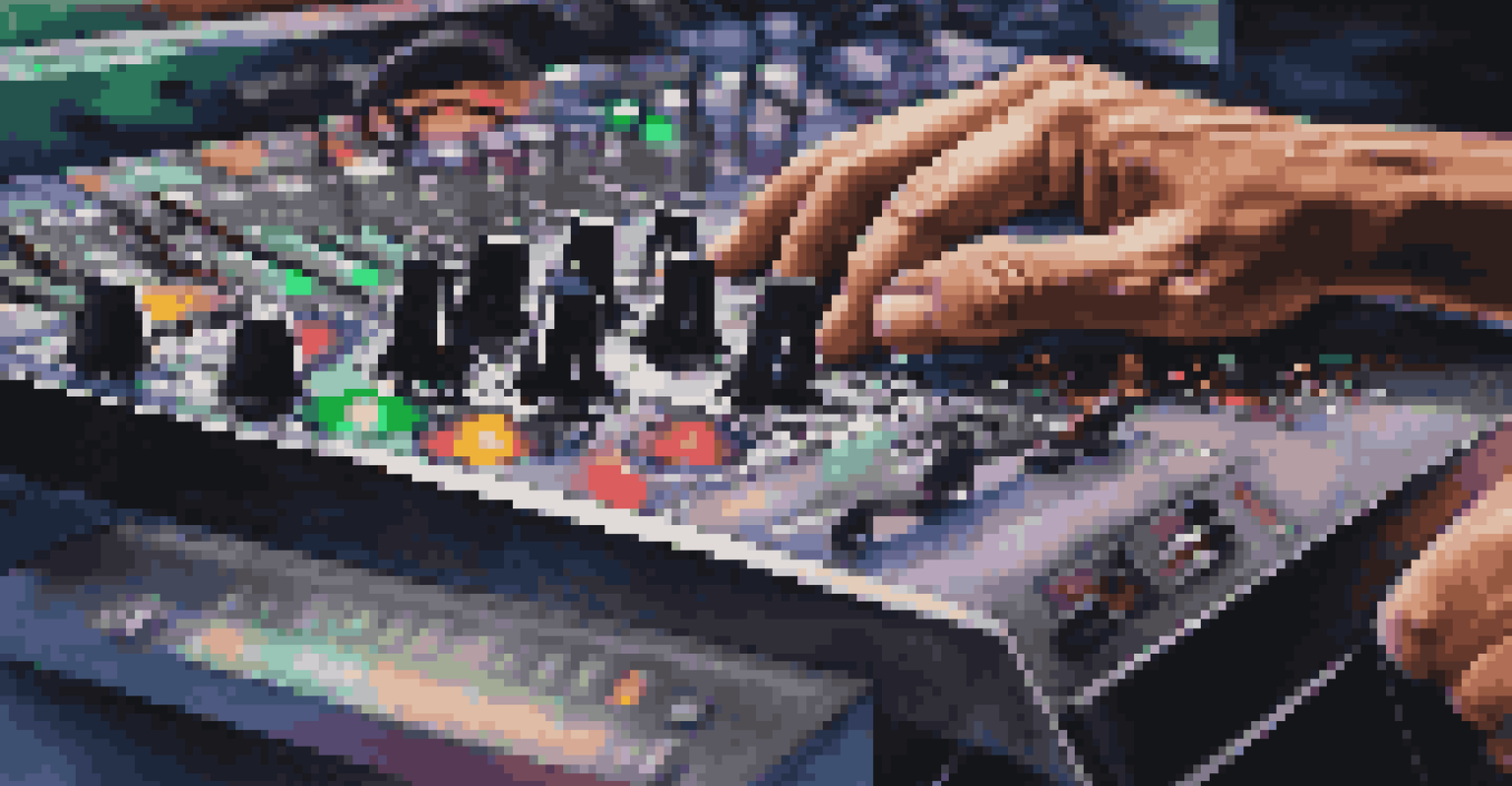The Importance of Practice in Music Production Skills Development

Understanding the Role of Practice in Music Production
Practice is the backbone of skill development in any discipline, and music production is no exception. Just like a painter perfects their brush strokes, a music producer hones their craft through consistent practice. It’s not merely about repetition; it’s about engaging with the tools and techniques that enhance creativity and efficiency.
Practice does not make perfect. Only perfect practice makes perfect.
When a producer practices regularly, they become familiar with their software and hardware, leading to quicker decision-making and a more intuitive workflow. This familiarity allows for greater experimentation, enabling producers to push their creative boundaries. Think of it as learning to ride a bike; the more you practice, the more natural it feels.
Ultimately, the time spent practicing translates to a deeper understanding of music theory, sound design, and mixing techniques. This foundational knowledge is crucial for producing high-quality tracks that resonate with listeners.
Building Confidence Through Repetition
One of the most significant benefits of practice is the boost in confidence it provides. Each session spent creating music or experimenting with sounds builds a sense of accomplishment. This confidence is vital, especially when sharing your work with others or collaborating with fellow musicians.

As you repeat certain techniques or concepts, they become second nature. For instance, mastering a new plugin or instrument can initially feel daunting, but with practice, it transforms into a tool you wield effortlessly. Just like athletes train to perform under pressure, producers need that same level of comfort with their craft.
Practice Builds Music Production Skills
Consistent practice enhances familiarity with tools, leading to quicker decision-making and deeper musical understanding.
This newfound confidence encourages producers to take risks, leading to innovative sounds and unique compositions. It's often in these moments of experimentation that the most exciting ideas are born.
Enhancing Creativity Through Structured Practice
Practice doesn’t have to be monotonous; it can be a structured yet creative process. Setting specific goals for each practice session can help you focus on different aspects of music production, such as sound design, arrangement, or mixing. This targeted approach not only keeps things interesting but also ensures a well-rounded skill set.
Creativity is intelligence having fun.
For example, you might dedicate one week to experimenting with drum patterns and the next to melody creation. This variety prevents burnout and keeps your creative juices flowing. It’s similar to how a chef might focus on mastering one dish before moving on to another.
Moreover, structured practice sessions can lead to unexpected discoveries. As you push yourself to explore new techniques, you might stumble upon a sound or method that becomes a signature element in your music.
The Importance of Feedback in Practice
Feedback plays a crucial role in the practice process, especially in music production. Sharing your work with others—be it friends, mentors, or online communities—provides valuable insights that can enhance your skills. Constructive criticism can illuminate blind spots in your technique or inspire new ideas.
Receiving feedback is akin to having a map when navigating through a complex city. It helps you understand where you might be going wrong and how to adjust your course. This guidance can be instrumental in your growth as a producer.
Feedback Fuels Growth and Creativity
Receiving constructive feedback from peers helps identify blind spots and inspires new ideas in music production.
Incorporating feedback into your practice routine not only improves your technical abilities but also teaches you to accept and utilize criticism positively. This resilience is essential in the music industry, where collaboration and adaptability are key.
Setting Realistic Goals for Effective Practice
Setting realistic goals is essential for making the most of your practice time in music production. Instead of overwhelming yourself with lofty ambitions, break down your objectives into manageable tasks. For instance, aim to learn one new technique each week rather than mastering every aspect of music production at once.
This approach allows for steady progress and fosters a sense of achievement as you complete each goal. It’s much like training for a marathon; you wouldn’t run the full distance on your first day. Instead, you’d gradually build your stamina.
Moreover, setting specific goals helps track your improvement over time. By documenting your progress, you can reflect on how far you’ve come, which can be incredibly motivating.
Exploring New Genres and Styles for Growth
One of the most exciting ways to enhance your music production skills is by exploring new genres and styles. Stepping out of your comfort zone can introduce you to different techniques, instruments, and production methods. For example, if you're primarily a hip-hop producer, trying your hand at electronic music can open up a world of possibilities.
This exploration can also spark new ideas, leading to innovative fusions of genres that set your work apart. Imagine a classical piece infused with modern electronic elements—the result could be a captivating sound that draws listeners in.
Explore Genres for Innovative Ideas
Diving into different music genres expands your creative toolkit, fostering unique sound combinations that captivate listeners.
Moreover, learning about various genres deepens your understanding of music as a whole. It equips you with a diverse toolkit that you can apply to your own productions, ultimately enriching your creative palette.
Cultivating a Consistent Practice Routine
Consistency is key when it comes to developing your music production skills. Establishing a regular practice routine not only helps you stay disciplined but also ensures that you’re continually improving. Just like a musician who practices their instrument daily, a producer benefits from regular engagement with their craft.
Finding a routine that works for you can involve setting aside specific times each week for focused practice. This could be as simple as dedicating an hour each evening to producing. The goal is to create a habit that becomes a natural part of your day.

Over time, this consistency leads to significant growth. You’ll find that the small, daily efforts accumulate, resulting in notable improvements in your skills and creativity.